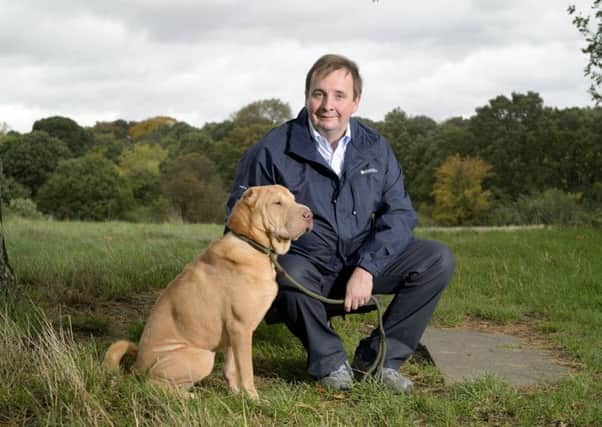Interview: Mark Neale on rise of Mountain Warehouse


Neale says “we love a bit of rain” because people like to wrap up in the thermals, fleeces, skiing jackets and so on that are Mountain Warehouse’s stock-in-trade when the weather is bad.
And it is perhaps why more than 20 of the retailer’s 180-plus UK shops are north of the Border, from Aviemore and Edinburgh to Elgin, Fort William, Inverness, Perth and Sterling Mills – its first Scottish outlet, opened one year after he founded the business in 1997 with £40,000 and a single shop in Swindon. “There’s a lot of outdoors in Scotland,” he says, laconically.
Advertisement
Hide AdAdvertisement
Hide AdThe business has been growing sales at 20 per cent a year, with revenues of £110 million in the financial year to March 2015, boosting profits 25 per cent to £12m. Of Mountain Warehouse’s 1,500 staff, 160 are in Scotland, with annual sales here topping £12m. Meanwhile, its shop on Edinburgh’s Princes Street has seen a 20 per cent jump in business since the disruptive tram works finished.
And Neale’s preference for middle-aged customers with some residual zest? “We are not for you if you want to climb Mount Everest. We are for people who like walking the dog, watching the kids play sport, gardening. Some of our best customers are middle-aged people who like doing stuff.”
That brings us to why the 2007-08 financial crash, which saw queues round the block at Northern Rock and the near-collapse of HBOS, also had a silver lining. “We first made money in 2007. It took me ten years to become an overnight success,” Neale jokes.
“The financial crisis was not unhelpful in some ways as shop leases became available,” he adds. “In the ten years to 2007 we opened 30 shops. But in the next three years to 2010 we went from 30 to 100.” And when retailer Woolworths went belly-up some years back it also allowed him to snap up prized touristy locations for an outdoor clothing business, such as Keswick in the Lake District and Fort William in the Scottish highlands.
The Mountain Warehouse boss is still frustrated, however. “We struggle to find strong locations,” he says. “In St Andrews, for instance, we cannot find a shop for love nor money. The last shop that became available there was Clinton Cards (which went into administration) and they had ten offers. We are also trying to buy in Aberdeen but the shops are more than we can afford.”
Neale says “tourist towns, market towns, cathedral cities” are the main targets for Mountain Warehouse’s expansion.
The business, which he says has also received a boost to its cycling and running gear from the London Olympics in 2012, is on the front foot now. As well as the core UK bricks-and-mortar operation, the online and international operations are booming. It has a dozen stores in Poland, and will open its second outlet in Germany later this year.
Online sales, meanwhile, have soared to £20m a year, up 50 per cent last year, and up from just £1m five years ago. “I’m not a big believer in business platitudes, but the omni-channel thing genuinely works. If we open a shop we get more online orders because of better brand awareness. And if we have not got a correct size customers will just place an order online. The shop offering and online work together.”
Advertisement
Hide AdAdvertisement
Hide AdAlthough things are going well now, it was not always plain sailing for the entrepreneur. After leaving Oxford with a physics degree, “I did not know what I wanted to do”. He worked as a management consultant in the City of London between 1989 and 1994 and then set up a rollerblades retail business.
Neale’s mum “went ballistic”, he says, thinking her son was wasting his degree. Rollerblades didn’t work out, although one of his customers was a certain Mick Jagger at the store in Kingston near the rock star’s home in Richmond. There were further stints trying to set up a toy chain and greetings card business before Mountain Warehouse. “You push at doors that are half open, and learn from your mistakes,” he says.
On issues facing the broader retail industry, Neale reckons the recent national living wage introduced by Chancellor George Osborne in his recent Budget to much consternation in some business circles – it will be £9 by 2020 – will cost Mountain Warehouse about £500,000.
But he is positive about it. “I have been supportive of increasing the minimum wage for quite a long time. But we can’t only pay it ourselves. We need a level playing field in a massively competitive market. You need other retailers playing by the same wage rules as us. I also think it will feed through into more retail sales. The people who are paid the minimum wage are the people who tend to spend all the money they have. It will benefit all retailers.”
Mountain Warehouse has had the backing of Italian, Greek, Icelandic and British private equity houses down the years, but in 2013 Neale spearheaded a management buyout of the last of them, Lloyds Development Capital, which left him with 85 per cent of the company and his colleagues the rest.
He dismisses speculation that the company might look to float on the stock market to bankroll further expansion, or even that he might be interested eventually in selling the business at a tidy profit.
On a flotation, he says: “I never say never. But there are no plans. We don’t really need any external capital. We have the £5m to £6m a year we need for expansion from our own resources.”
And on selling up? “I’m 47. What else am I going to do? I’m building a business to sell stuff, not it. Not everyone is trying to make a quick buck and move to the Bahamas.”